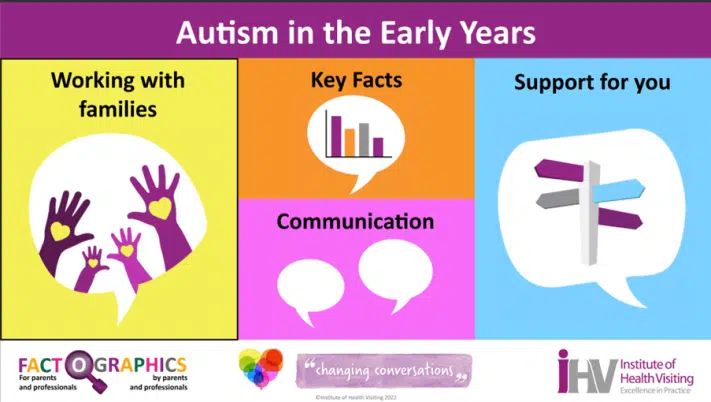Autism in the Early Years Factographic
This factographic was funded by NHS England, and co-designed with professionals and families, to share useful information and resources to support parents and carers who have children in the Early Years, who they think may have autism. Also for professionals to support learning and understanding of autism in the Early Years and pre-diagnosis.
There are 4 sections to the factographic:
Working with families – this section shares insights from parents of autistic children, and those with lived experience, about what life is like with autism, and before diagnosis.
Key facts – this section gives background facts about autism and aims to dispel some common myths, as well as signs of what autism can look like in the early years.
Communication – this section has information about the different ways autistic people may communicate, as well as tools that can support communication development, and how to understand what behaviour may be communicating.
Support for you – this section signposts to various organisations that support families and professionals with different aspects of autism.
To access, please click on the link above or the image below:
GPP – Understanding behaviour to support the sensory needs of children with autism
This GPP aims to support understanding of the what’s behind behaviour so that timely advice and support can be offered to families, tailored to the needs of the child.
GPP – Supporting children on the autism spectrum and their families
Autism is a lifelong developmental disability. Autistic people see, hear and feel the world differently to other people.
GPP – Supporting families with pre-school children to promote their SLC development when there are signs of autism or learning difficulties
One of the key aims of the Healthy Child Programme (2009) is to support ‘school readiness’, which includes the early identification of children showing signs of developmental delay and those who would benefit from early intervention. Speech, language and communication (SLC) skills are a core part of this and the promotion and review of these skills should be a part of every health visitor contact.
GPP – Understanding sleep issues in children with additional needs
These Good Practice Points set out what health visitors need to know on understanding sleep issues in children with additional needs.
PT – Using positive statements to guide our children
It can sometimes be hard for parents/carers of children with autism to understand and support their child’s behaviour. This can be frustrating for both the parents/carers and the child. This parent tip offers some simple strategies to support parents/carers to communicate what they would like their child to do.
GPP – Supporting children on the autism spectrum and their families
Autism is a lifelong developmental disability. Autistic people see, hear and feel the world differently to other people.


